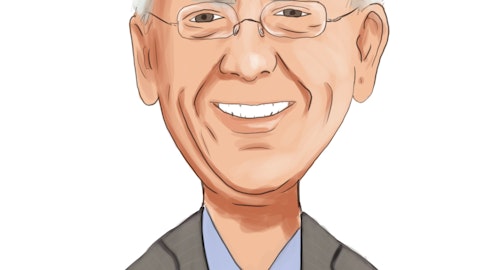7. Fresenius Medical Care (NYSE:FMS)
Number of Hedge Fund Holders: 11
Fresenius Medical Care (NYSE:FMS) provides dialysis products and services and offers care for patients with chronic kidney disease. Its services range from operating outpatient dialysis clinics and providing home dialysis support to developing and distributing essential dialysis equipment and pharmaceuticals. It also offers related medical services like vascular care and renal pharmaceuticals.
The Care Delivery segment contributed to the company’s turnaround in 2024 and achieved a 10.7% operating income margin, which surpassed the 10% target. This resulted from positive price and volume effects, productivity gains, labor efficiency enhancements, and a focused international portfolio. US same-market treatment growth turned positive for the full year and reached 0.5% in Q4 2024. The segment mitigated weather-related impacts to just 0.05% in Q3 and Q4.
For 2025, Fresenius Medical Care (NYSE:FMS) projects positive US market treatment growth above 0.5%, which is expected to be driven by the rollout of the 5008X hemodiafiltration machine. This is an advanced medical device used in dialysis to filter waste products from the blood. It offers improved treatment efficiency compared to traditional hemodialysis. Revenue is expected to increase by around €100 million from the value-based care business and reach about €1.9 billion in 2025.
Ariel Global Fund sees the market’s fear regarding GLP-1 drugs impacting dialysis demand as overblown. The fund thinks this presents a buying opportunity for Fresenius Medical Care (NYSE:FMS) and stated the following in its fourth quarter 2023 investor letter:
“We added positions in, leading providers of dialysis services, DaVita, Inc. and Fresenius Medical Care AG (NYSE:FMS). Fresenius Medical Care AG & Co. is the worldwide leader in the treatment of renal disease, while Davita, Inc. administers its services to over 2,700 outpatient dialysis centers across 45+ states and operates over 350 outpatient dialysis centers in 12 total countries. The shares of each company came under pressure following the release of clinical data on the efficacy of glucagon-like-peptide-1 (GLP-1) weight-loss drugs and their potential to negatively impact the demand for dialysis, providing us with attractive entry points in both names. Even assuming high rates of both uptake and effectiveness, we believe the overall impact on dialysis volumes will be small in the near-to-medium term. We also think the cardio protective effects of the GLP-1 class may enable patients to live longer, thereby increasing the overall size of the end-stage renal disease incidence pool. We believed the market misunderstood the actual long-term clinical impact on dialysis and were able to purchase at attractive valuation levels.”





